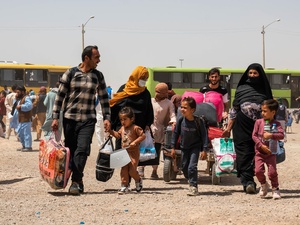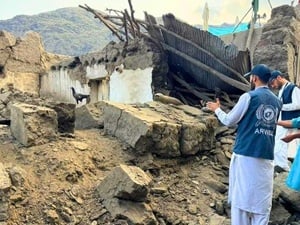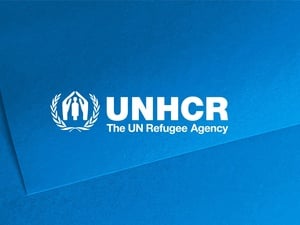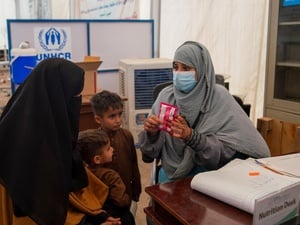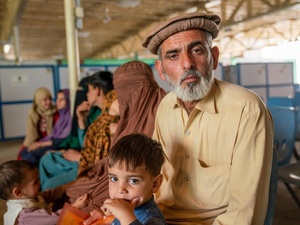Afghans flock home as repatriation programme takes hold
Afghans flock home as repatriation programme takes hold

Afghan refugees on their way home Wednesday having registered at the Takhtabaig centre.
KABUL, March 6 (UNHCR) - In the largest return of refugees from Pakistan since UNHCR began its assistance programme for returnees last week, almost 3,500 people crossed the border into Afghanistan Wednesday while hundreds of internally displaced persons were transported from Kabul to their homes in the Shomali Plain.
Wednesday's returns raised the number of people going home to more than 9,200 in the first four days of the joint U.N.-Afghan Interim Authority operation. They arrived at the Takhtabaig registration centre outside the Pakistani city of Peshawar in 261 cars and trucks filled with belongings accumulated during years of exile.
UNHCR opened the Takhtabaig centre to register refugees opting to go home so they can receive a $20 transportation allowance at Mohmandara on the Afghan border, and relief aid including plastic sheeting, blankets and tools at their final destinations. In addition, the World Food Programme provides each family with 150 kilogrammes of wheat.
The U.N. agency plans to open a second registration centre in Quetta by mid-March. Seven such centres are planned for Pakistan that will be able to register about 35,000 people a day once they become fully operational. A similar programme is expected to start next month in Iran, where UNHCR and the government are preparing ten registration centres set to open from April 1. Pakistan and Iran currently host more than 3.5 million Afghan refugees.
In Kabul, UNHCR and the Afghan Ministry of Repatriation transported 700 internally displaced people from the city's old Soviet compound to Qarabagh in the Shomali Plain, a two-hour trip by road. In a two-week operation, the agency plans to return some 15,000 people who fled the central Afghan plain due to fighting three years ago.
The returnees from the former Soviet compound are provided with the same food and relief aid as the refugees. In addition, however, they receive a package of tools, farming implements, and seeds. The region, once one of Afghanistan's most fertile areas, became a barren wasteland following years of war and drought.
The U.N. refugee agency late last year helped 8,000 displaced Afghans sheltered in the Panjshir valley to return to Shomali, while another 8,000 people returned to the region on their own initiative.
The Afghans returning to Shomali emerged from their decaying apartments before sunrise Wednesday to board a convoy of 25 buses and 12 trucks hired by the International Organization for Migration, which is overseeing the logistical aspects of the operation. Some of those returning carried doors, windows and chairs they recovered from the piles of wreckage that dot the war-ravaged neighbourhood west of Kabul.
"I always wanted to get away from here," said Habibullah Daudzai, who is returning to the village of Bagar in Qarabagh district. "We are farmers, we grew wheat, apples, peaches and walnuts. We lived a good life. I am happy to return to my land."
For Afghans heading back to the Shomali Plain, the initiative starting today will be an emotional return to the once-peaceful region. Many will find their homes and gardens gone. But returnees like Habibullah are undaunted by the challenges ahead.
"We will rebuild our houses, clear the irrigation system, grow trees and again feed ourselves," he said as he stepped into a bus for the trip back home.


